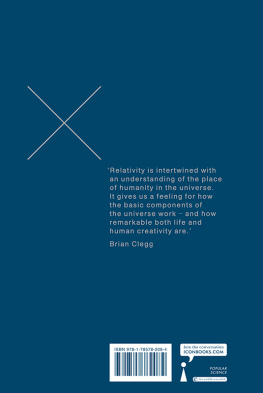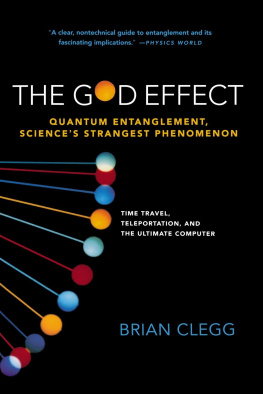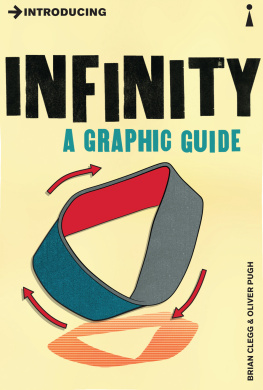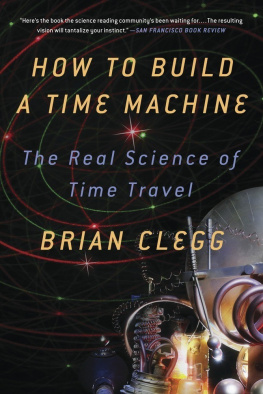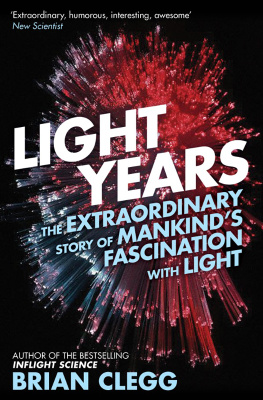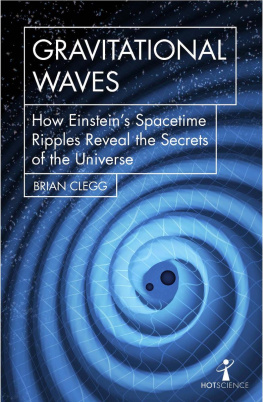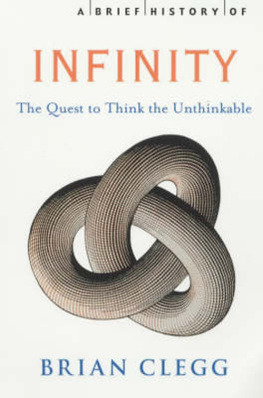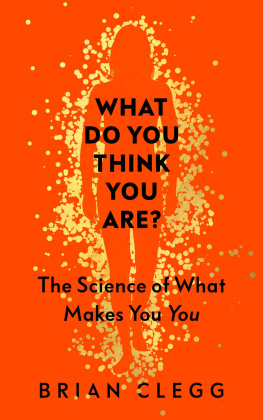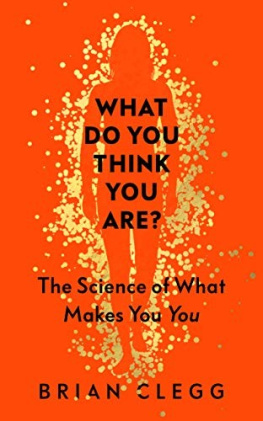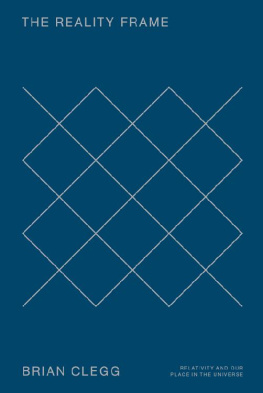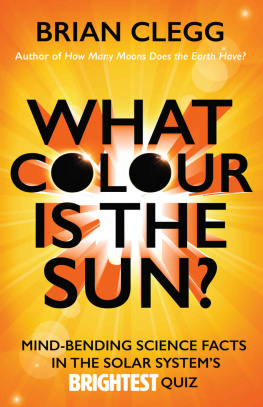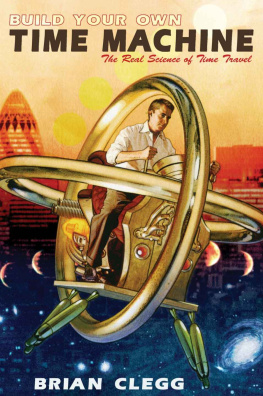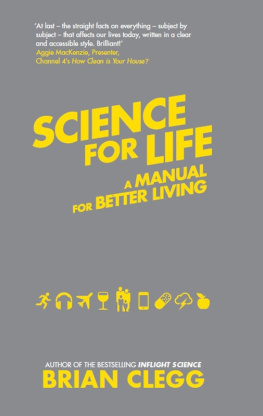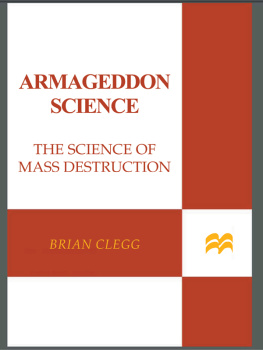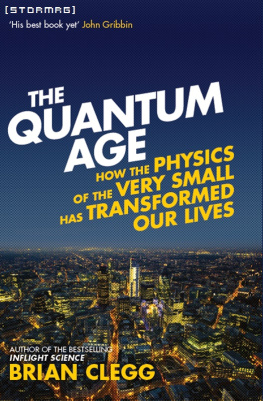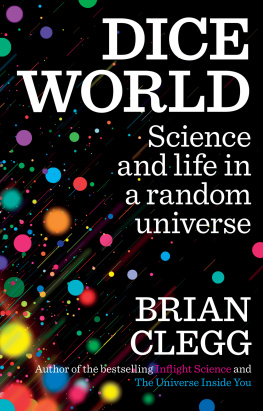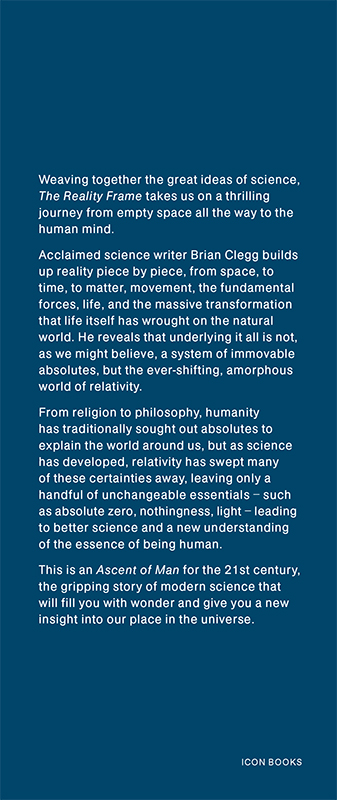THE REALITY FRAME
Also by Brian Clegg, published by Icon Books:
Inflight Science
The Universe Inside You
The Quantum Age
Dice World
Light Years
Science for Life
Introducing Infinity
How Many Moons Does the Earth Have?
What Colour Is the Sun?
THE REALITY FRAME
RELATIVITY AND OUR PLACE IN THE UNIVERSE
BRIAN CLEGG

Published in the UK in 2017
by Icon Books Ltd, Omnibus Business Centre,
3941 North Road, London N7 9DP
email:
www.iconbooks.com
Sold in the UK, Europe and Asia
by Faber & Faber Ltd, Bloomsbury House,
7477 Great Russell Street,
London WC1B 3DA or their agents
Distributed in the UK, Europe and Asia
by Grantham Book Services,
Trent Road, Grantham NG31 7XQ
Distributed in the USA
by Publishers Group West,
1700 Fourth Street, Berkeley, CA 94710
Distributed in Canada by Publishers Group Canada,
76 Stafford Street, Unit 300,
Toronto, Ontario M6J 2S1
Distributed in Australia and New Zealand
by Allen & Unwin Pty Ltd,
PO Box 8500, 83 Alexander Street,
Crows Nest, NSW 2065
Distributed in South Africa
by Jonathan Ball, Office B4, The District,
41 Sir Lowry Road, Woodstock 7925
Distributed in India by Penguin Books India,
7th Floor, Infinity Tower C, DLF Cyber City,
Gurgaon 122002, Haryana
ISBN: 978-178578-208-4
Text copyright 2017 Brian Clegg
The author has asserted his moral rights.
No part of this book may be reproduced in any form, or by any means, without prior permission in writing from the publisher.
Typeset in Bembo by Marie Doherty
Printed and bound in the UK
by Clays Ltd, St Ives plc
For Gillian, Chelsea and Rebecca
ABOUT THE AUTHOR
Science writer Brian Clegg studied physics at Cambridge and specialises in making the strangest aspects of the universe accessible to the general reader. He is editor of popularscience.co.uk and has written for newspapers and magazines from The Times and The Wall Street Journal to BBC Focus and Playboy. His previous books include Inflight Science, The Universe Inside You and Science for Life.
Absolute Beginners
Relativity is at the heart of this book. Were used to relativity meaning a complex bit of physics dreamed up by Albert Einstein and Einsteins work is certainly part of it. But there is far more to relativity than that.
To get a feel for relativity at its basic level, we need to take a trip to 1624 to join Galileo on Lake Piediluco in Umbria, central Italy. According to the story, he was being rowed by several oarsmen along the beautiful lake, taking a group of friends on an outing. They were travelling across the water at a good speed by the measure of the day. Galileo is said to have asked one of his friends, Stelluti, if he could borrow a heavy object. Stelluti reluctantly handed over his house key. Four hundred years ago this was not going to be a delicate little Yale key, but was a big iron object and a one-off that would be hard to replace.
To Stellutis horror, Galileo took the key from him and hurled it as hard as he could, straight up in the air. The boat, remember, was being powered across the water at a considerable speed. So Stelluti was all ready to leap into the lake, fearing the boat would slip away as the key fell, leaving the precious object behind to drop into the water. His friends had to restrain him, but of course the key neatly dropped back into Galileos lap.
Whether this story is true is a matter of debate Galileo accumulated plenty of tales that have little factual evidence to support them. But what certainly was justified was Galileos confidence in what would become known as relativity. Stelluti had made the very natural assumption that the fast-moving boat would slip out from under the key while the heavy metal object was in the air. However, he hadnt thought through what is truly meant by moving. Galileo had.
In the frame
Relativity comes into play whenever we undertake anything that involves a frame of reference the specific environment and circumstances in which it is observed as happened on Galileos boat. Its both a way of looking at things and an essential requirement to understand how they interact. We use relativity to understand the aspects of physical reality that have no meaning in isolation, but need a frame of reference to give them context. This relativity can involve anything from detecting movement to exploring our place in the universe. Relativity explains how much damage will be caused by a car crash, how we can travel through time, and how gravity does its job. It can be difficult to get a feel for the role of relativity and why it frequently seems to run counter to our common sense expectations: to get a firm grip on this, we are going to build our own universe from scratch.
This is clearly a major undertaking. Realistically, of course, we can only skim the surface of the complexities of the universe. But even so, it will be sufficient to explore the multi-faceted nature of relativity.
The concept of a frame of reference is going to be the central theme in uncovering relativitys role. A frame of reference is the context in which something operates. It can be purely physical. Take a simple statement that you might see in a play script: Emma walks from left to right. Without a frame of reference, we dont know whose viewpoint we are taking. Are we looking at the stage from the audience, or are we at the back of the stage, looking out onto the auditorium? Without a clear frame of reference, we have no idea in which direction the actor playing Emma is walking. So scripts will usually say Stage left or Stage right to make the context clear.
Of themselves, terms like left and right are relative. A frame of reference is needed to make sense of them. Such physical frames give us the most basic form of relativity. So, for instance, when Galileo was on the lake, it was certainly true that the boat was moving when compared with the shore or with the water. That was self-evidently factual. But that movement could not be considered universal. If the boat were moving in the passengers frame of reference, for example, they would soon be left behind and would suffer a soaking. As far as they were concerned, the boat wasnt moving at all. It was the water and the shore in fact the whole Earth that was moving backwards for them.
This should have been obvious if, for instance, one of them had put his fingers into the lake. He would feel water moving backwards against his skin. And the same went for the key. In the boats frame of reference the key wasnt moving backwards or forwards, just up and down. So it inevitably fell back into Galileos lap, rather than being left behind in the boats wake.
There was a hint of reasoning that made Stellutis misunderstanding forgivable. Once the key left the boat, the boat and the key had different forces acting on them. Both were being pulled downwards by gravity. Both were being slowed down by air resistance, also known as drag. But the boat also had two other forces at play the much stronger drag from the water, and the force of the oars pushing it forwards. Given enough time in the air, with nothing to push it forwards, the key would have been slowed a little by air resistance and if the key had spent long enough in the air, the boat would eventually have overtaken it. But in practice, for such a heavy object, the impact of air resistance was tiny. If Galileo had thrown a sheet of paper into the air, the result might have been quite different.

